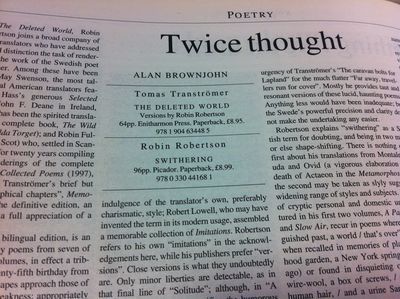Tomas Transtromer: Accept no imitation
The Nobel Prize in Literature for 2011 has today gone to the Swedish poet Tomas Transtromer. Transtromer is the first poet to win the prize since Wislawa Szymborska in 1996, and the first Swedish recipient since 1974.
The Nobel Academy already stood charged of Eurocentrism, making Transtromer something of a defiant choice. Many TLS readers will associate his name with another controversy not of his own making.
Back in 1998 we were invited in the pages of the paper to consider Transtromer's work, "the work of a major, even a great, modern poet"; and the "icy Nordic romanticism of bleak forests, remote villages, and shorelines" where "half-smothered, the gods of summer / fumble in sea-mist". A year later, Paul Binding, commented on the "sophisticated and intellectually adventurous" writers of Sweden, who were surely nurtured by an equally sophisticated and intellectually adventurous society.
So far, so un-extraordinary. Then, in 2007, Alan Browjohn began a review by noting the many translators who had "addressed with devotion and distinction the task of rendering into English the work of the Swedish poet Tomas Transtromer". Robin Robertson's "versions" of Transtomer had recently appeared, leaving Brownjohn to consider the nuances of the terms "translation", "version" and "imitation". But for one reader he was being too "diplomatic". According to Robin Fulton, "An excessively large number of Robertson's lines are identical to mine in my Transtromer translations". Further, "Robertson makes arbitrary changes to the Swedish, a language he does not seem to understand". And so the spat began proper.
Robertson was not the first to make such "arbitrary changes" and take liberties with the language, added W. S. Milne: "The most famous (or perhaps notorious?) case is that of Robert Lowell in his Imitations of 1961". "If only Robertson had vandalized Transtromer in the way Lowell vandalized his originals", came the response. Others weighed in with both opinions and further related questions: Is the translator of poetry meant to recreate the sense of the original? Or should they do their best to recreate "the music, the atmosphere, the entire spirit" of it? Is it possible to do one, without doing the other?
Here's a question of our own: Was it all just "a muddy, mean-spirited and potentially damaging squabble over nothing"? Decide for yourself by reading the argument in full, here.
Of course, the Swedish Nobel committee did not need to translate Transtromer to consider him for this year's laureateship. They chose him because "through his condensed, translucent images, he gives us fresh access to reality".
Peter Stothard's Blog
- Peter Stothard's profile
- 30 followers





